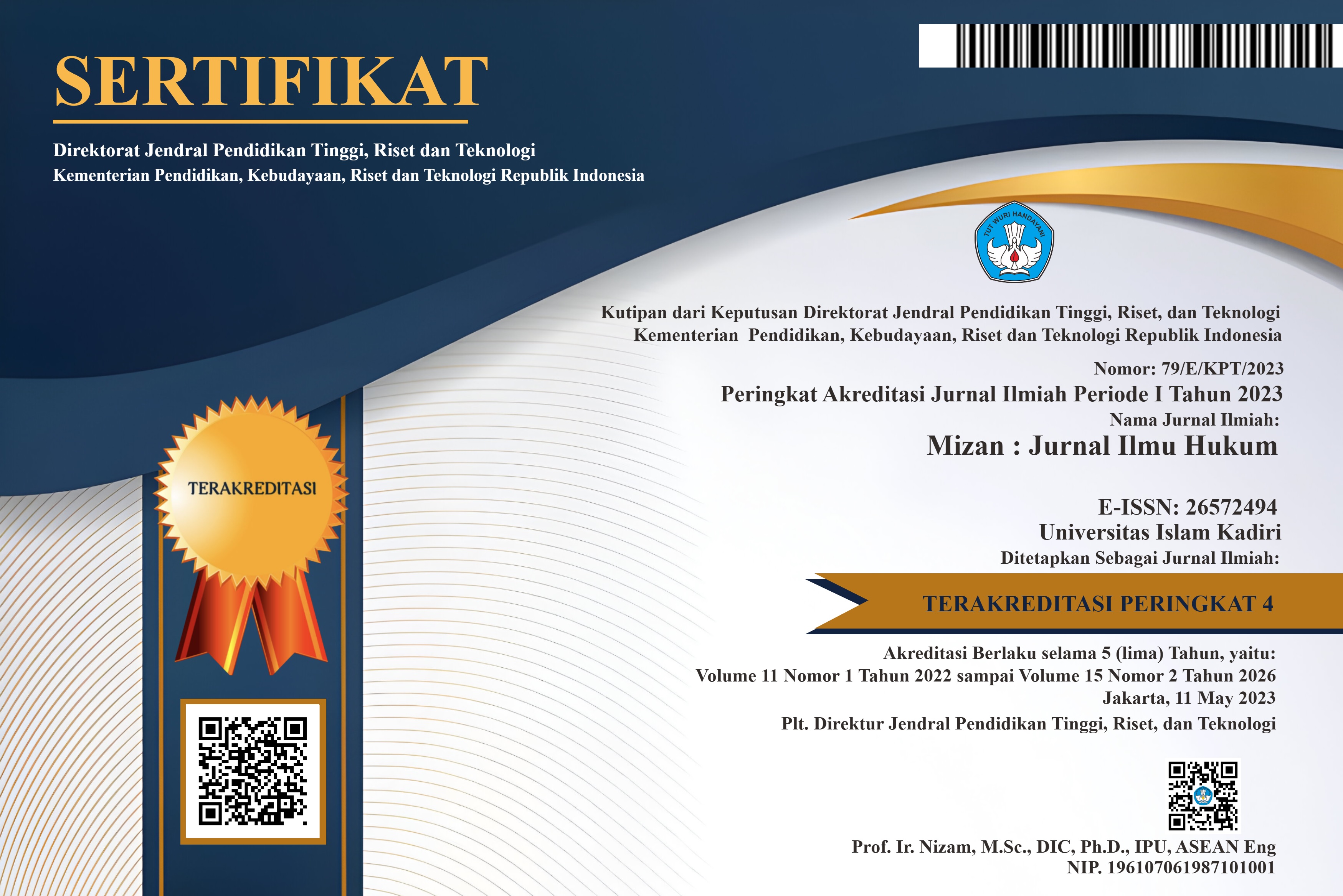PERKAWINAN BEDA AGAMA DI INDONESIA (Studi Putusan 916/Pdt.P/2022/Pn.Sby dan Putusan Nomor 71/Pdt.P/2017/PN Bla)
Abstract
Indonesia as a pluralistic country certainly has many implications, one of which is interfaith marriage, now interfaith marriages are so widespread in Indonesia, one of which is the Surabaya District Court Decision Number 916/Pdt.P/2022/Sby giving permission to the applicants, namely Rizal Adikara and Eka Debora Sidauruk to register their marriage with the population and civil registry office, However, not all applications for interfaith marriages are granted by judges, through decision Number 71/Pdt. The law in Indonesia does not explicitly prohibit interfaith marriages in Indonesia so that judges must explore the values that exist in society, therefore the difference in decisions will be explored regarding the consideration of judges giving different decisions. The purpose of this study is to analyse the validity of interfaith marriages in terms of Islamic law and positive law, to analyse the basis of the Judge's consideration in the birth of the difference in Decision Number 916/Pdt.P/2022/PN.Sby and Decision Number 71/Pdt.P/2017/PN Bla. The research method used is normative. The results of this study are the validity of interfaith marriages according to Islamic law is haram and prohibited, while interfaith marriages according to positive law in Indonesia are carried out through court decision permits and Surabaya district court considerations focus on juridical considerations while the Blora district court considers philosophical values
References
Asmin. 1986. Status Perkawinan Antar Agama Ditinjau dari Undang-Undang Perkawinan No.1/1974. Jakarta: PT.Dian Rakyat.
Atabik, A. & Mudhilah, K. Desember 2014. Pernikahan Dan Hikmahnya Perspektif Hukum Islam. YUDISIA, Vol. 5, No. 2.
Ediwarman. 2011. Monograf. Metode Penelitian Hukum (Panduan Penulisan Tesis dan Disertasi). Medan.
Eoh, O. S. 1996. Perkawinan antar-Agama dalam Teori dan Praktek. Jakarta: PT. Raja Grafindo Persada.
Fatwa Majelis Ulama Indonesia Nomor: 4/MUNAS VII/MUI/8/2005 Tentang Perkawinan Beda Agama.
https://islam.nu.or.id/nikah-keluarga/hukum-nikah-beda-agama-AJkWC. Diakses pada pada 10 Februari 2023.
https://jdih.tanahlautkab.go.id/artikel_hukum/detail/menelaah-perkawinan-beda-agama-menurut-hukum-positif: “Menelaah Perkawinan Beda Agama Menurut Hukum Positifâ€. Dikses pada 15 November 2022.
https://muhammadiyah.or.id/hukum-nikah-beda-agama-majelis-tarjih-haram/. Diakses pada 10 Februari 2023.
Hazairin. 1990. Demokrasi Pancasila, Jakarta: Rineka Cipta.
Hukum Nikah Beda Agama, Majelis Tarjih: Haram!. https://muhammadiyah.or.id/hukum-nikah-beda-agama-majelis-tarjih-haram/. diakses pada 10 Februari 2023.
Humani. 2017. Kontruksi Hukum Perkawinan Beda Agama Dalam Perspektif Islan Dan Hukum Positif Indonesia. Vol 7 No.1 Januari
Marzuki, P. M. 2007. Penelitian Hukum. Jakarta: Kencana Prenada Group.
Pasal 2 Kompilasi Hukum Islam. 2000. Yogyakarta: Pustaka Widyatama.
R.Sardjono,"Berbagai Masalah Hukum dalam Undang-undang Republik Indonesia No 1 tahun 1974 tentang Perkawinan". Jakarta: Universitas Trisakti.
Said, A., dkk. Putusan Mahkamah Agung No. 1400 K/Pdt/1986. Jakarta: Mahkmah Agung,
Samidjo. 1985. Pengantar Hukum Indonesia. Bandung: C.V Armico
Santoso. Hakekat Perkawinan Menurut Undang-Undang Perkawinan, Hukum Islam Dan Hukum Adat. Semarang: UNISSULA.
Sukarti, D. 2003. Perkawinan Antar Agama menurut Al-Qur’an dan Hadist. Vol 15. Jakarta: PBB UIN.
Trisnaningsih, M. 2007. Relevansi Kepastian Hukum dalam Mengatur Perkawinan Beda Agama di Indonesia. Bandung: Penerbit Utomo.
Undang-Undang Dasar Negara Republik Indonesia Tahun 1945
Undang-Undang Republik Indonesia Nomor 1 Tahun 1974 Tentang Perkawinan (Lembaran Negara Republik Indonesia Tahun 1974 Nomor 1).
Zamrroni, M. 2018. Prinsip-Prinsip Hukum Pencatatan Perkawinan Di Indonesia. Surabaya: Media Sahabat Cendkia









